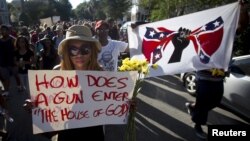African-Americans and Latinos believe fixing the gun violence crisis in the U.S. would also help resolve other societal ills that are plaguing America, new research shows.
Research released by Benenson Strategy Group (BSG) found that a reduction in gun violence could help lower America’s incarceration rate – the world’s highest - and improve relationships between police and citizens in minority communities.
BSG’s findings were based on surveys of four focus groups and interviews with 1,200 registered voters. The participants were equally represented by African-Americans and Latinos, two segments of the U.S. population who are disproportionately affected by gun violence.
Four in 10 African-Americans and nearly 3 out of 10 Latinos in the U.S. have been personally affected by gun violence, the survey found. These numbers make minority insight into gun-related issues particularly valuable.
“We need to listen to those most affected by gun violence and make sure their voices are heard as we formulate solutions,” said Spencer Overton, president of the Joint Center for Political and Economic Studies.
Deaths from gun violence
The interconnection of gun violence, incarceration and policing was evident among the respondents.
For example, 74 percent of the respondents between 18 to 29 years-old believe keeping guns out of the wrong hands would decrease the number of people in prison. And about sixty-percent of African-Americans and Latinos felt fewer guns on the street would lead to improved relationships between police and residents in minority communities.
The research was released on Thursday in Washington, D.C. alongside a related study that proposes a “road map” to combat the gun crisis in the U.S.
Gun violence, the study said, was the leading cause of death in 2014 for African-American males between the ages of 15 to 34, and the second leading cause of death for Latino males in the same age group.
“Gun violence thrives in economically-challenged areas and areas that have easy access to firearms,” said Overton.
Integrated solutions
The study, titled “Engaging Communities in Reducing Gun Violence: a Road Map for Safer Communities,” recommends a multifaceted approach involving policymakers, government officials and citizens.
“What the research tells us more and more is that integrated solutions can help move the needle,” said Urban Institute President Sara Rosen Wartell.
The study said methods are needed to prevent guns from getting into the hands of “high-risk” people through background checks and other programs. Police-community relations can be improved, it said, with surveys, civilian review boards and body cameras. Greater investment in “wraparound” social services programs and more collaboration between community, religious, non-profit, police and other government officials would also help reduce gun violence, the study said.
The road map report is based on information collected from meetings with more than 100 community members in Richmond, Virginia; Milwaukee, Wisconsin and Stockton, California. The goal was to interact directly with citizens in various communities and identify factors that drive gun violence and strategies to reduce it.
The survey and the report are part of an ongoing project involving the Joint Center for Political and Economic Studies, the Joyce Foundation and The Urban Institute.





